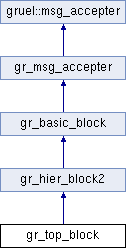gr_top_block Class Reference
Top-level hierarchical block representing a flowgraph. More...
#include <gr_top_block.h>

Public Member Functions | |
| ~gr_top_block () | |
| void | run (int max_noutput_items=100000) |
| The simple interface to running a flowgraph. | |
| void | start (int max_noutput_items=100000) |
| void | stop () |
| void | wait () |
| virtual void | lock () |
| virtual void | unlock () |
| void | dump () |
| int | max_noutput_items () |
| Get the number of max noutput_items in the flowgraph. | |
| void | set_max_noutput_items (int nmax) |
| Set the maximum number of noutput_items in the flowgraph. | |
| gr_top_block_sptr | to_top_block () |
Protected Member Functions | |
| gr_top_block (const std::string &name) | |
Friends | |
| GR_CORE_API gr_top_block_sptr | gr_make_top_block (const std::string &name) |
Detailed Description
Top-level hierarchical block representing a flowgraph.
Constructor & Destructor Documentation
| gr_top_block::gr_top_block | ( | const std::string & | name | ) | [protected] |
| gr_top_block::~gr_top_block | ( | ) |
Member Function Documentation
| void gr_top_block::dump | ( | ) |
Displays flattened flowgraph edges and block connectivity
| virtual void gr_top_block::lock | ( | ) | [virtual] |
Lock a flowgraph in preparation for reconfiguration. When an equal number of calls to lock() and unlock() have occurred, the flowgraph will be reconfigured.
N.B. lock() and unlock() may not be called from a flowgraph thread (E.g., gr_block::work method) or deadlock will occur when reconfiguration happens.
Reimplemented from gr_hier_block2.
| int gr_top_block::max_noutput_items | ( | ) |
Get the number of max noutput_items in the flowgraph.
| void gr_top_block::run | ( | int | max_noutput_items = 100000 | ) |
The simple interface to running a flowgraph.
Calls start() then wait(). Used to run a flowgraph that will stop on its own, or when another thread will call stop().
- Parameters:
-
max_noutput_items the maximum number of output items allowed for any block in the flowgraph. This passes through to the start function; see that function for more details.
| void gr_top_block::set_max_noutput_items | ( | int | nmax | ) |
Set the maximum number of noutput_items in the flowgraph.
| void gr_top_block::start | ( | int | max_noutput_items = 100000 | ) |
Start the contained flowgraph. Creates one or more threads to execute the flow graph. Returns to the caller once the threads are created. Calling start() on a top_block that is already started IS an error.
- Parameters:
-
max_noutput_items the maximum number of output items allowed for any block in the flowgraph; the noutput_items can always be less than this, but this will cap it as a maximum. Use this to adjust the maximum latency a flowgraph can exhibit.
| void gr_top_block::stop | ( | ) |
Stop the running flowgraph. Notifies each thread created by the scheduler to shutdown, then returns to caller. Calling stop() on a top_block that is already stopped IS NOT an error.
| gr_top_block_sptr gr_top_block::to_top_block | ( | ) |
| virtual void gr_top_block::unlock | ( | ) | [virtual] |
Unlock a flowgraph in preparation for reconfiguration. When an equal number of calls to lock() and unlock() have occurred, the flowgraph will be reconfigured.
N.B. lock() and unlock() may not be called from a flowgraph thread (E.g., gr_block::work method) or deadlock will occur when reconfiguration happens.
Reimplemented from gr_hier_block2.
| void gr_top_block::wait | ( | ) |
Wait for a flowgraph to complete. Flowgraphs complete when either (1) all blocks indicate that they are done (typically only when using gr.file_source, or gr.head, or (2) after stop() has been called to request shutdown. Calling wait on a top_block that is not running IS NOT an error (wait returns w/o blocking).
Friends And Related Function Documentation
| GR_CORE_API gr_top_block_sptr gr_make_top_block | ( | const std::string & | name | ) | [friend] |
The documentation for this class was generated from the following file:
